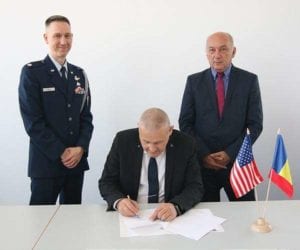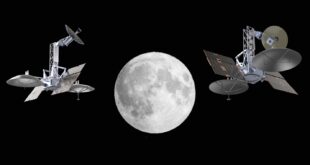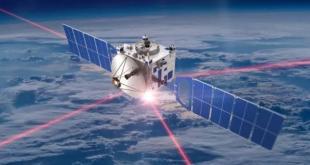
U.S. Strategic Command (USSTRATCOM) reached a milestone with the signing of its 100th space situational awareness agreement when the Romanian Space Agency signed an agreement with USSTRATCOM on 25 April 2019. These agreements foster openness, predictability of space operations and transparency in space activities.
With the signing, Romania becomes the 20th nation joining Australia, Japan, Italy, Canada, France, South Korea, the United Kingdom, Germany, Israel, Spain, the United Arab Emirates, Belgium, Norway, Denmark, Brazil, the Netherlands, Thailand, New Zealand and Poland; two intergovernmental organizations, the European Space Agency and the European Organization for the Exploitation of Meteorological Satellites; and 78 commercial satellite owner/operator/launchers already participating in SSA data-sharing agreements with USSTRATCOM.
In 2011, USSTRATCOM was delegated the responsibility for signing SSA agreements on behalf of the U.S. government with governmental agencies and commercial satellite owners and operators to provide space information such as conjunction assessment, launches, deorbits, and reentry assistance.
“Signing the 100th SSA is an enormous milestone,” said Vice Admiral Dave Kriete, U.S. Strategic Command deputy commander. “Effective monitoring and space situational awareness requires cooperation – we cannot do it alone. We encourage others to join us. Agreements like these build our relationships and allow the space community to be more effective in space activities, enhancing the safety of space for all nations.”
USSTRATCOM will continue to work with all responsible space-faring nations to ensure a safe, secure, sustainable and stable space environment.
“The agreement with USSTRATCOM is a cornerstone of Romania’s present and future developments in space surveillance and tracking,” said Dr. Marius-Ioan Piso, Romanian Space Agency president.
“For the past decade, the Romanian Space Agency has constantly been investing in space safety projects and programs, being aware of the importance of space assets as critical infrastructure for our society. In this context, this agreement is at the core of our SSA efforts, but also an important step forward, built upon a long-term collaboration between Romania and the United States. We welcome this agreement that strengthens the collaboration between our nations.”
Piso also explained that Romania was one of the first Eastern European countries to sign collaborations with NASA in the ’70s, taking and processing the images from U.S. satellites. Currently, both countries are collaborating in areas such as space exploration, the International Space Station, nano-satellites and planetary defense. Romania and the U.S. worked together on space applications for areas such as precision agriculture, telemedicine and disaster monitoring.
“Space situational awareness agreements formalize relationships with other nations and are crucial to normalizing future space operations,” said Rear Admiral Richard Correll, USSTRATCOM director of plans and policy. “As space becomes more contested, agreements like these move us closer to creating norms for space activities.”
USSTRATCOM has global responsibilities assigned through the Unified Command Plan that include strategic deterrence, nuclear operations, space operations, joint electromagnetic spectrum operations, global strike, missile defense and analysis and targeting.





